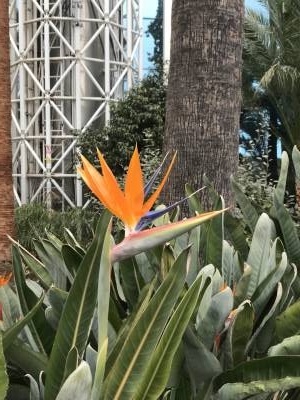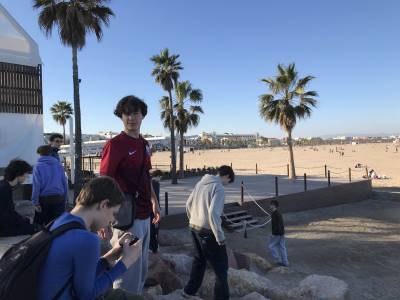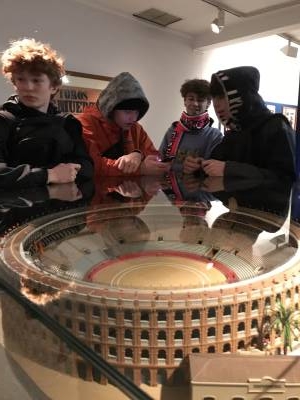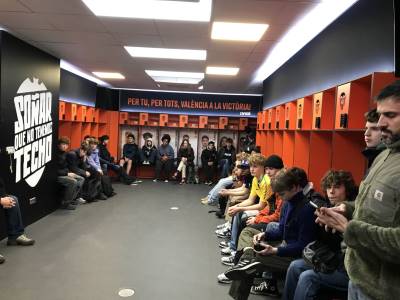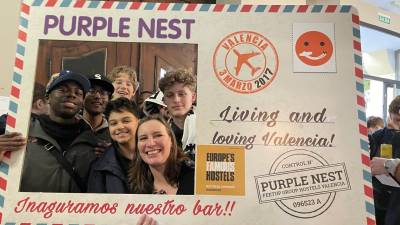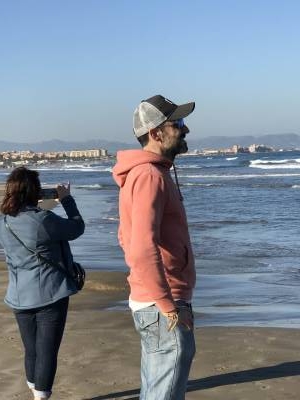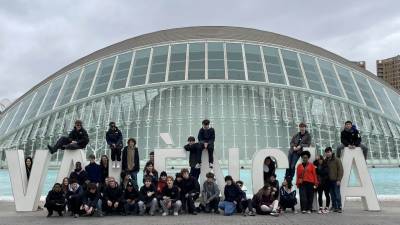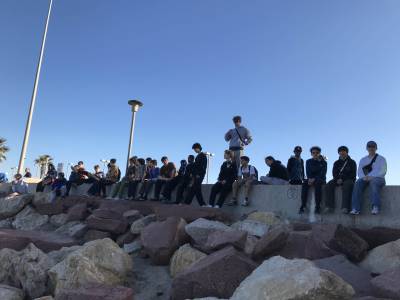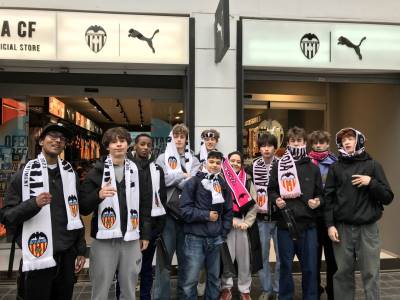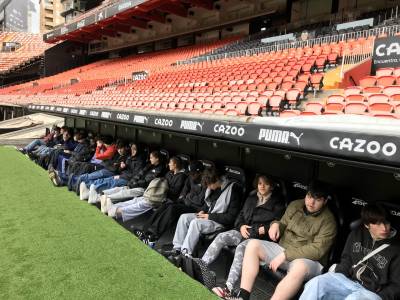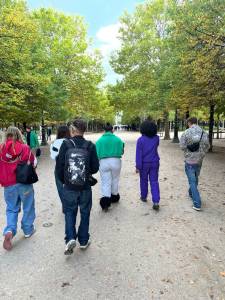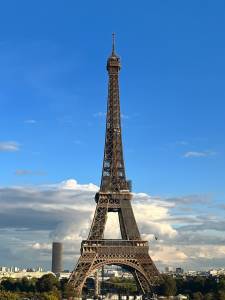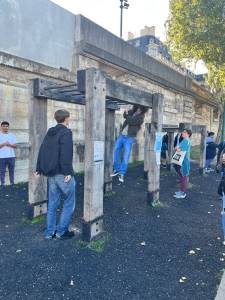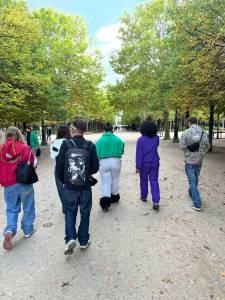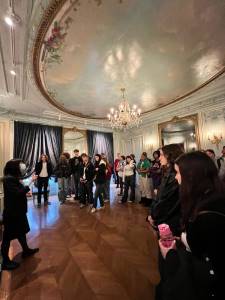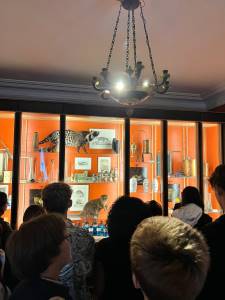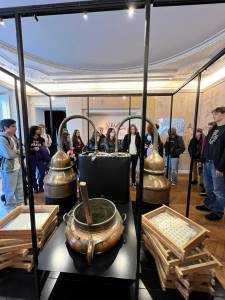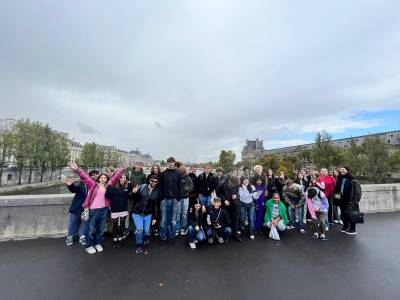- Diary
Dates - Latest
News
Languages
Those who know no foreign language know nothing of their mother tongue.
Johann Wolfgang von Goethe
The MFL department believes that languages are part of the cultural richness of our community, society and the world in which we live and work. Learning languages contributes to mutual understanding, a sense of global citizenship and personal fulfilment. All students at Acland Burghley learn either Spanish or French in KS3, and are encouraged to continue studying a language to the end of KS4.
We are a multilingual school and encourage all students who speak and write in another language at home to take public examinations in their native language. This has included Turkish, Hebrew, German, Greek, Russian, Arabic, Spanish and Italian. Students perform excellently and we are very proud of them.
Through studying a Modern Foreign Language, students learn to appreciate the different countries, cultures and communities locally and further afield. The MFL department is a mix of native and non-native speakers of French and Spanish, of whom some speak Italian. We are all enthusiastic about the languages we teach and use our range of experiences to enthuse our students.
In addition to developing skills in listening, speaking, reading and writing, students have the opportunity to explore the language and culture outside the classroom.
The ability to understand and communicate in another language is a lifelong skill for education, employment and leisure. It increases confidence, independence and creativity and crucially supports the development of literacy skills overall.
We are working closely with the Latin teacher to strengthen links for children between their study of Latin and MFL. Please see more information in the Latin section.
Head of Faculty
K Jacob | kjacob@aclandburghley.camden.sch.uk
Second in charge
B Williams | bwilliams@aclandburghley.camden.sch.uk
Teachers
M Collins | mcollins@aclandburghley.camden.sch.uk
L Deacon | ldeacon@aclandburghley.camden.sch.uk
J Harper | jharper@aclandburghley.camden.sch.uk
S James | sjames@aclandburghley.camden.sch.uk
L Miguel | lmiguel@aclandburghley.camden.sch.uk
K Smith | ksmith@aclandburghley.camden.sch.uk
E Watson | ewatson@aclandburghley.camden.sch.uk (Classics and Latin)
E Sanida | esanida@aclandburghley.camden.sch.uk (Classics and Latin)
Teaching Assistant
E G Salvador | egarcia@aclandburghley.camden.sch.uk (Spanish Language Assistant)
Curriculum Intent and Map
Our curriculum map below shows students’ learning journey through KS3, 4 and 5. Throughout the key stages, students explore the similarities and differences between other languages and English, learning how language can be manipulated and applied in different ways.
Curriculum
KS3
Y7 students are taught in mixed ability classes in either French or Spanish and are then set until the end of Y9, according to their ability. Depending on our cohort, we regularly review our sets.
We aim to build on the prior knowledge and understanding students have of the language that they have encountered in Key Stage 2 as well as making links with other home languages spoken.
Our Schemes of Learning and resources in Key Stage 3 are carefully designed with the demands of the new GCSE in mind. Key vocabulary and grammatical structures are introduced and revisited across a range of topic areas. These are then built on and further developed in Key Stage four.
Keen linguists in Y9 have the chance to study a second language (either French or Spanish) alongside the language currently being studied. This allows them to choose 2 modern languages for GCSE.
In Y9 we discuss in lessons ‘What’s the point?’ in studying a language so that students understand the importance in their future studies and careers of having a Language GCSE.
This is what your child will study in French at KS3
Y7 French
Autumn term:
- Greetings, names & feelings
- European Day of Languages and Language awareness
- Classroom language
- The alphabet
- Numbers, age & dates
- Description of self, character adjectives
- Colours and agreement
- Classroom equipment
Spring term:
- Description of family members
- Talking about your siblings
- Description of oneself as well as others: physical and personality
- French comics
- Talk about your friends and how long you’ve known them
- Description of pets
Summer term:
- Where you live, what languages you speak & your nationality
- A study of the map of France
- Description of your local area
- Description of your house including types of house and floors
- Description of the rooms and their positions
- Talking about the furniture and where they are positioned
Y8 French
Autumn term:
- Giving opinions of food and drink
- Eating and drinking habits
- Meals in France and French-speaking countries
- Talking about a past meal
- Discuss healthy and unhealthy eating
- Discuss what it is to be in shape or not
- French cuisine
- Understand recipes in French
- Shopping for food and quantities
Spring term:
- Talk about sports and games you play and do
- Talk about extreme sports
- French sportsmen/women
- The Olympics and Paralympics
- Discuss musical instruments
- Cultural awareness about French singers and French chansons
- Talk about your leisure activities
Summer term:
- Give opinion about school subjects
- Use the 24-hour clock and the 12-hour clock
- Talk about your timetable
- French schools in the past
- Use simple reflexive verbs
- Describe your daily routine
Y9 French
Autumn term:
- Describe what you're wearing
- Express your opinion of outfits
- Describe outfits from the past and contrast with the present
- Describe what you're going to wear for a party
- Learn about higher numbers and the euro currency
- Shops and shopping
- Shopping for clothes
- Inviting people out and reacting
Spring term:
- Pathway launch – Languages at KS4
- Discuss what you watch and like watching on TV as well as others
- Discuss TV programs
- Discuss cinema and film review
- Inviting someone out to the cinema and other events
Summer term:
- Countries, nationalities and languages
- Talk about ideal destinations
- Talk about your holiday
- Talk about holiday preferences
- The perfect tense in French
- Describe a past holiday
Y9 French fast track medium term plan
This is what your child will study in Spanish at KS3
Y7 Spanish
Autumn term:
- Greetings, names and feelings
- Classroom language
- Cultural awareness of the Spanish speaking world
- European Day of Languages and Language awareness
- The Spanish alphabet and phonics
- Numbers, age & dates
- Day of the dead celebrations in Mexico
- Colours and agreement
- Classroom items and school equipment
- Christmas celebrations in Spain
Spring term:
- Countries, nationalities and languages spoken
- Family
- Physical descriptions
- Character descriptions
- Pets and animals
Summer term:
- Talking about school subjects/teachers and giving opinions
- Telling the time and describing a timetable in a Spanish school
- Mealtimes and what you eat and drink food and drink
- Means of transport and preferences
- Describing your school environment
Y8 Spanish
Autumn term:
- Sports and extreme sports
- Leisure activities
- Music and cultural awareness about Spanish music
- TV and film
- Christmas celebrations in Spanish speaking countries
Spring term:
- New year's resolutions
- Technology
- Shopping and clothes
- Household chores
- Making invitations and excuses
Summer term:
- Different types of areas to live
- Compass points and cultural awareness of the regions of Spain
- Description of housing
- Bedroom and furniture
- Talk about daily routine
Y9 Spanish
Autumn term:
- Describe your city and local area
- Where you would like to live in the future
- Asking and giving directions
- Talking about the weather in the present
- Food and drink
- Meals in Spain and Spanish-speaking countries
- Shopping for food
- Ordering tapas
- Understanding recipes in Spanish
Spring term:
- Pathway launch - Languages at KS4
- Healthy living and New year's resolutions
- Parts of the body, illnesses and remedies
Summer term:
- Holiday destinations and preferences
- Cultural awareness of Spanish speaking countries as holiday destinations
- Transport and comparing different forms of transport
- Future holiday plans
- Past holiday descriptions
- Weather across three tenses
Y9 Spanish fast medium track term plans
Enrichment opportunities
French and Spanish cooking club: Tuesday 3.20pm in TE4
Recipe Tortilla de patatas with chips
KS4
At KS4, our objective is to enable students of all abilities to develop their French/Spanish language skills to their full potential, equipping them with the knowledge to communicate in a variety of contexts with confidence, whether or not students decide to continue studying languages at A level.
Our curriculum follows the AQA syllabus and aims to consolidate the learning, knowledge and skills that students have gained at KS3.
Some topics build on learning from KS3 (e.g., family, school, homes, holidays) whilst others allow students to discuss issues which are interesting and relevant to young people, for example: customs and festivals, health and environmental problems, celebrity culture, new technology, post-16 studies and future employment. Through these themes, students will deepen their understanding of how language works, enrich their vocabulary and become more independent linguists.
In addition to linguistic development, students will learn about life across the Francophone/Hispanic world, encouraging students to step beyond their familiar cultural boundaries and deepen their curiosity for the wider world. Where possible, we make cross-curricular links with subjects such as science, geography, history and sociology, so that students may draw on their knowledge of these disciplines and use them to enrich their language learning experience.
Students are expected to discuss their opinion of topics by appropriately applying grammatical knowledge and vocabulary.
As the study of French/Spanish involves a deep analysis of grammar, students’ knowledge of their own language(s) is enhanced, which improves their command of English and supports progress in their other subjects. Students are encouraged to compare and contrast grammatical points between English, and use cognates, root words and the history of language to learn new words.
Students taking the higher tier will learn more complex grammar such as the use of the subjunctive, the pluperfect tense and the passive voice, which will prepare them for A level language studies.
The skills of listening, reading, speaking and writing which were introduced to students at KS3 are still paramount in the KS4 syllabus, as students are required to sit a paper in each of the four skills. Students are explicitly taught meta-cognitive and exam strategies in how to approach each skill.
We have a strong uptake in languages at KS4 and our results have been consistently good.
The year 2024 marked the beginning of the new specification for GCSE modern foreign languages. Whilst much remains the same, students will now be tested on their understanding of grapheme-phoneme links through the transcription of a dictated text and a reading aloud task. Finally, all written instructions and questions in the exam papers will now be in English, meaning the skill of reading comprehension is only assessed in the students’ understanding of passages in the reading paper.
Students sitting their French/Spanish GCSE from and including 2026 will be assessed according to the new specification.
Y10 French and Spanish
Autumn term: Theme 1: People and lifestyle
- Unit 1: Identity and relationships with others
- Unit 2: Healthy living and lifestyle
Spring term: Theme 2: Popular culture
- Unit 3: Education and work
- Unit 4: free time activities
Summer term: Theme 2: Popular culture
- Unit 5: Customs, festivals and celebrations
- Mock exam preparation
Y11 French and Spanish
Autumn term: Theme 2: Popular culture
- Unit 6: Celebrity culture
- Unit 7: Travel and tourism, including places of interest (as part of Theme 3)
Spring term: Theme 3: Communication and the world around us
- Unit 8: Media and technology
- Unit 9: The environment and where people live
Summer term:
Revision of the GCSE course content and exam preparation
Y11 French medium term planY11 Spanish medium term plan
GCSE Subject Specification
Please click through to the links to view more information on the AQA website.
New specification (first examined in summer 2026)
French: https://www.aqa.org.uk/subjects/french/gcse/french-8652/specification/specification-at-a-glance
Spanish: https://www.aqa.org.uk/subjects/spanish/gcse/spanish-8692/specification/specification-at-a-glance
Enrichment opportunities
Y11 intervention Spanish: Monday and Friday 3.30pm in R3B
Y11 intervention French: Monday 3.30pm in R3C
Y10 intervention Spanish: Thursday 3.20pm in R3B
Y10 intervention French: Thursday 3.20pm in R2C
KS4 - Trips and Residentials
KS5
As part of the wider LaSWAP consortium, Acland Burghley offers the following A Levels.
In French, students learn about how French-speaking society has been shaped, socially and culturally, and how it continues to change. In the first year, aspects of the social context are studied, together with aspects of the artistic life of French-speaking countries. In the second year, we focus on life for those on the margins of French-speaking society as well as the positive influences that diversity brings, which links directly to the inclusive culture of our school. Students also study aspects of the social and political landscape of different French-speaking countries, such as immigration, crime and the justice system, trade union power and young people’s involvement in politics.
In Spanish, our approach is focused on technological and social change, looking at the multicultural nature of Hispanic society. In the first year, students learn about current and past trends in Hispanic society as well as Hispanic artistic culture. In the second year, students learn about multiculturalism in addition to aspects of the political landscape in the Spanish speaking world, such as monarchies and dictatorships and the function and influence of social movements.
Students further develop their understanding of the themes covered in the course through the study of a film/play and a book. For example, life for the marginalised and aspects of politics and immigration are reflected in the book L’Etranger and in the film La Haine for French. In Spanish, the study of the play La Casa de Bernarda Alba further their understanding of traditional Spanish values in the context of the early 20th century rural society. In addition, the film El Laberinto Del Fauno allows students to develop their awareness of post-civil war Spanish society and the traumas of war. In this way students acquire the cinematographic, literary language and concepts and analytical skills associated with films and book studies.
In their second year, students will have the opportunity to carry out independent research on a topic of their choice related to the Francophone/Hispanic world. The aim of the research project is to develop research skills, analysing and summarising their findings and then presenting them and debating them.
Please click through to the links to view more information on the LaSWAP website.
Enrichment opportunities
Y12 intervention
Spanish: Wednesday 3.20pm in R3B
French: Wednesday 3.20pm in R2C
Independent studies at all key stages
Suggested reading
- Collins Easy learning dictionary
- CGP revision guide (GCSE AQA)
-
Useful websites
www.linguascope.com: all the topics at KS3 and 4 can be learnt through fun and games (login details given by class teacher)
www.kerboodle.com: students can access our digital textbook at home (login details given by class teacher)
www.wordreference.com: a great online dictionary
www.123teachme.com: verb tables in Spanish
www.linguascorb.com: verb tables in French
BBC Bitesize: suitable for KS3 and KS4 students
Senecalearning: suitable for KS3, KS4 and KS5 students
Quizlet: suitable for KS3, KS4 and KS5 students
Things to see and do
- Exhibitions related to French or Spanish speaking artists
- Films in French/Spanish
- Listen to songs in French/Spanish on Youtube and get the lyrics from google
- Try or buy typical French/Spanish cuisines
- Spanish and French institute in London (Cervantes institute and l’Institut français)
- Look out in the press for French/Spanish festivals


